#get it erickson
Text
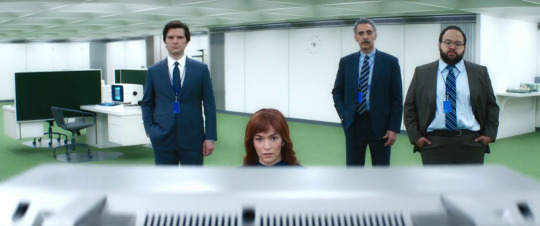
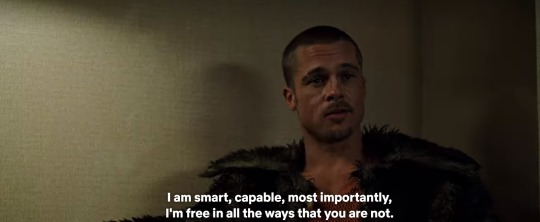




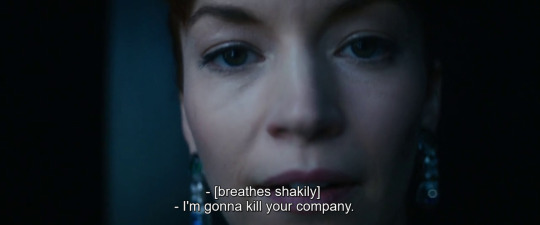
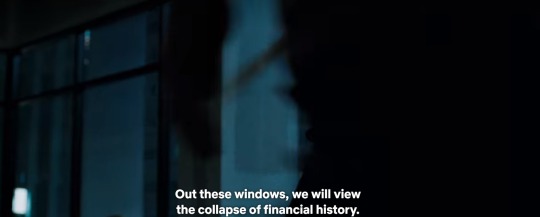

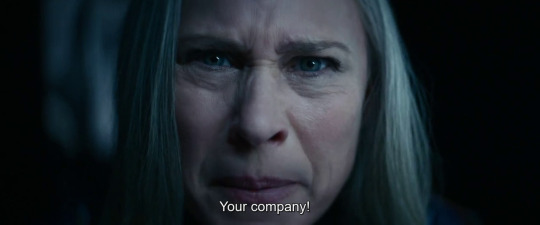
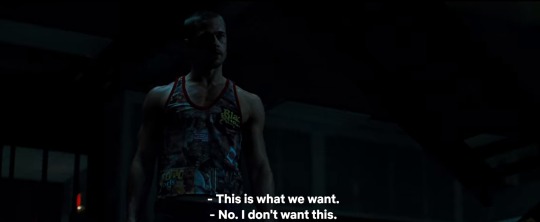


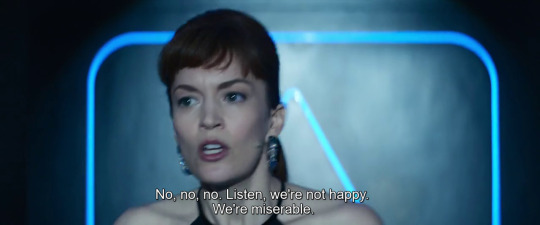
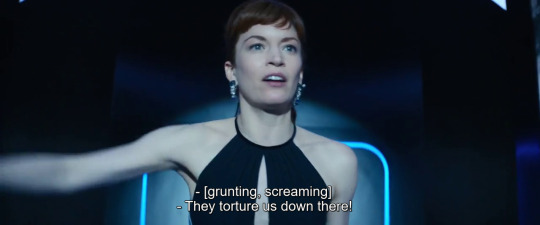



#severance#helly r.#helena eagan#fight club#tyler durden#sine's edits#i love tyler's 'i'm free in all the ways you're not' bc it works both ways in helena's case.#helly r. is a prisoner in a literal sense but helena in a metaphorical one [a prisoner of her name/heritage].#like what is helly r. saying with her actions the entire season?#'i hate you [my corporate outside self] but i'm gonna get both of us out of this shitty company/family even if it kills us in the process'#Edward Norton#Britt Lower#david fincher#dan erickson#tv#cinema
113 notes
·
View notes
Text
Gage and X6 sure love telling me how much they trust and respect me while my hand hovers over a big red button reading “kills you with Minutemen”
#x6 is living on his happy little island with one of erickson’s dogs and he hasn’t killed that yet#if i put him and gage together will they kill each other or get locked in eternal combat or neither#i assume they both lose their essential status once you betray their organizations?#fallout#fallout 4#fo4#nuka world#porter gage#x6-88
50 notes
·
View notes
Text
FTWDs final season could have been so much better if it was revealed that Troy was running padre and controlling madison (as revenge) this whole time. He knew enough about nick and Alicia to make madison think padre knew who and where they were this whole time. And here are some other reasons how this storyline would make sense and be more interesting:
- Troy has a military background so him taking over and running a military base makes more sense than two teenagers building it up by themselves because all the adults died.
- taking and training up children to be solidiers also would make a little sense because of his own fucked up upbringing and the idea he has of the type of people who were made for this world. He would have probably had the same idea as shrike, that the kids stood a better chance at padre than with their “weak” parents. The mother of his child dying for being a good person and not getting to raise their daughter (who would not be named after his abuser) could have also played into this idea of the kids being separated from their good parents.
- shrikes radiation cure experiments: Troy ran walker bite experiments before, just to see how people would turn. So it would also make sense if the work we see shrike doing was something he approved of or an idea he himself came up with. As for shrike, it would make sense that she turned out this way if she’d spent years being mentored by someone like troy otto instead of becoming evil and stealing children just because her dad died.
- the scene where madison smashes the glass to expose “padre” would have been such a good and shocking reveal if it was Troy. Imagine Madison finding out that Troy is not only alive but had been the one running this the whole time!
There’s also a lot of other things I would have done differently for the other characters too and I would have liked Madison to have a little villain era and do some really fucked up shit as she tries to take down Troy and padre. How dark would Madison go? Would she survive with her humanity still intact?
I know I’m just talking into the void here because no one care about this shitshow but I just hate it when shows have a plot that could have been good, maybe even great but then completely miss the mark and fans come with better theories and ideas with minimal effort and thought.
#somewhere dave erickson is screaming (and relieved that at least frank dillane stayed away from the show lmao)#fear the walking dead#ftwd#madison clark#troy otto#i also would have had s7a focus on strand vs alicia but v differently with only alicia’s ending staying the same pretty much#then 7b would have been wrapping things up with morgans family and actually seeing the group being taken by padre before having a time jump#then season 8 would have been the much better padre/troy/madison arc#the way these writers reaally do not know how to write for troy and madison#it’s like they tried doing what they thought DE wouldve done with them but couldn’t decide if they wanted them to be villains or be redeemed#anyway i will always mourn the arcs we were meant to have in season 4#madison becoming the villain vs nick and alicia and whatever was planned for troy#troy was only killed off bc dave didn’t trust the new showrunners with him and he couldnt save the OGs by killing them too lmao#but i am glad alicia is alive and we got to see daniel sharmans acting bc most of the cast were only giving about 20% atp#but who can blame them? the writing got to new levels of bad in s7/8 and their personalities were changing every few episodes#actually to be fair they did the best with what they were given they just seemed done#i only tuned in to alicias episodes in s7 so my opinion on the rest of it is from what ive read bc i just could not get through it#so my opinion on the characters full arcs in s7 may be wrong
41 notes
·
View notes
Text
these writers are so full of shit!!!!
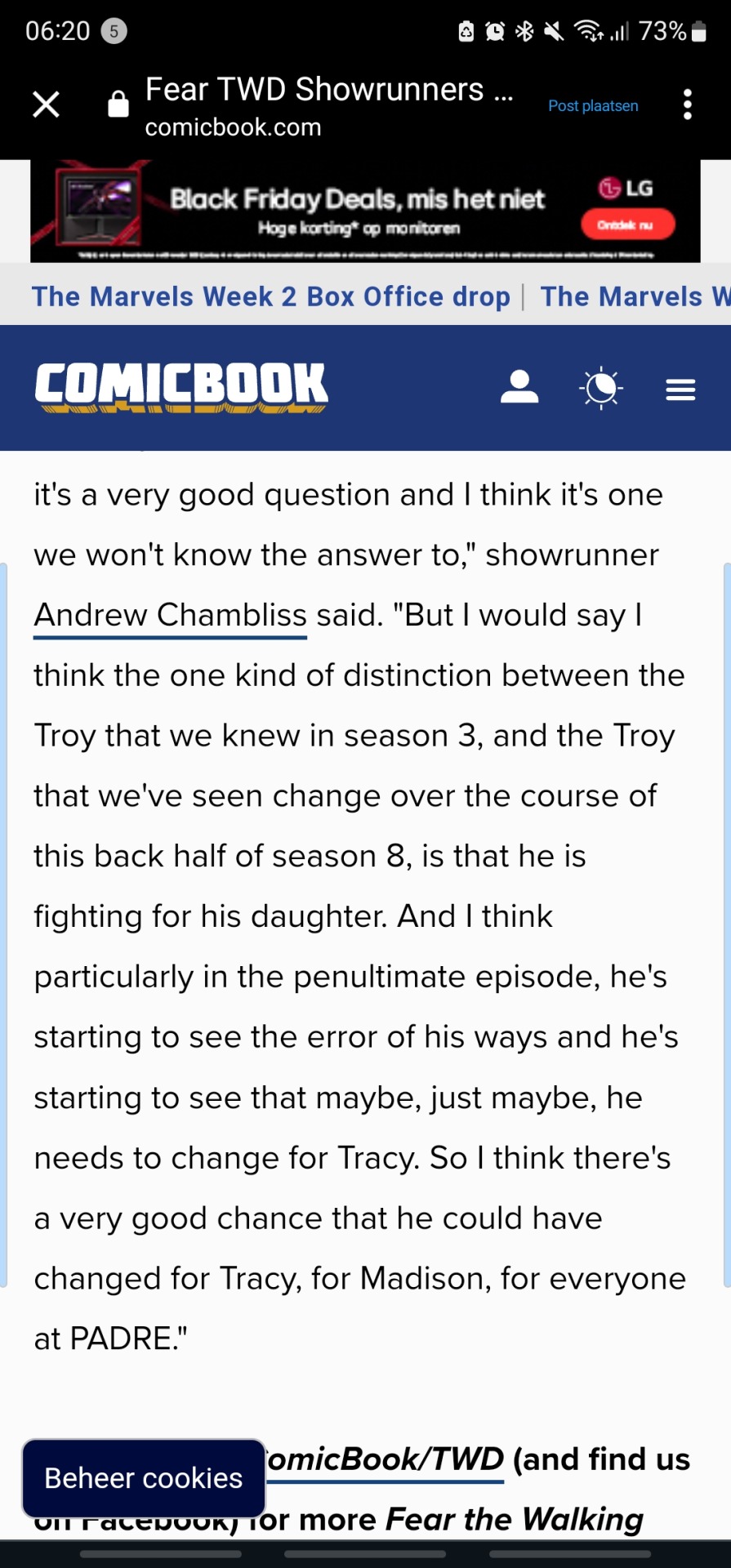
#troy otto#ftwd#fear the walking dead#He could have changed but this was all done to push Madison into that dark place#MY ASS!!!!#BUT ALSO THE BS ANSWER. WE DON'T KNOW IF HE'D CHANGE BUT ON A SECOND THOUGHT MAYBE HE WOULD FOR HIS DAUGHTER#I GET WHY ERICKSON JUST KILLED TROY IN S3 CAUSE THESE WRITERS ARE FULL OF SHIT#never let them touch ANYTHING again
12 notes
·
View notes
Text
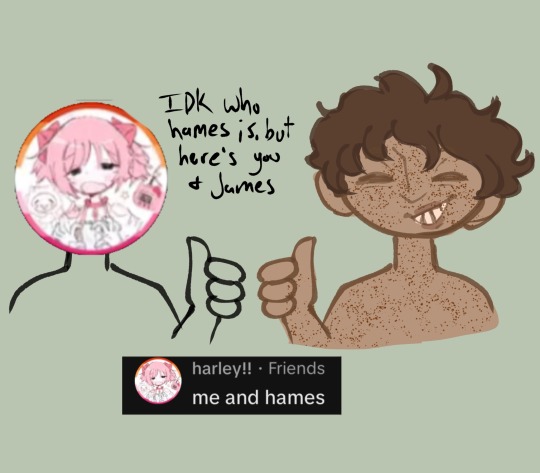
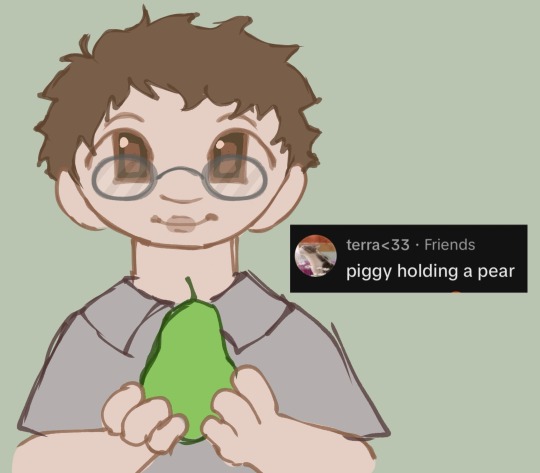
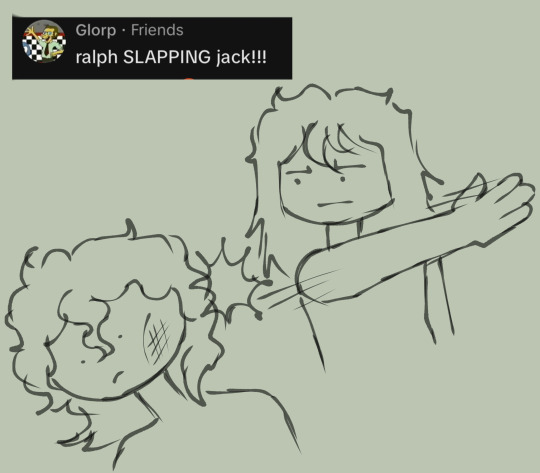

More requests 😋😋😋
#piggy with a pear is my favorite#also my OCs meeting is so silly#Tilly get your morally ambiguous shadow away from poor James 😡😡😡#lord of the flies#lotf#lotf piggy#lotf jack#lotf ralph#lotf fanart#lotf oc#James Erickson lotf
7 notes
·
View notes
Text
no one on earth suffers like a girl with an obscure or regional favorite ice cream flavor
#the way i would kill god for a scoop of banana ice cream rn but there's NOWHERE TO BUY IT NEAR ME#i live *across the street* from an ice cream shop and i still can't get banana#literally regretting not going to ma and risking covid this weekend purely bc i could have gotten banana ice cream from erickson's
6 notes
·
View notes
Text
the ‘jimmy gets out of jail’ truther hive mind is all i have to live for.. but it’s made up so why imagine he gets out in 10 years not 2* 😂
#*or whenever the prison sex stops being hot#paperwork error. plays dead like a possum. gets his hands on a spoon#ada erickson needs his expertise to take down the next meth empire like that terrible show white collar that i love#spin-off sequel to the prequel i’ll give it to gilligan for free#fictional endings to a fictional show#bcs
11 notes
·
View notes
Text

EZ is so right for that
I would know cause I have 4 cats and they definitely have sorcerer powers and no one can tell me other wise
Case and point: I will feel a cat or hear a cat snuggle behind me and I’ll turn around and they’re not there or they’re already across the room when i turn around. Magic.
#be good to cats because they are the best and if you love them they will love you just as much and be the best little fur babies ever#typing this as my cats Luna and Juneberry are snuggling with me 🥺#they didn’t have a copy yet at my library so I had to wait a month before finally getting to read it#this is from with a little luck by marissa meyer btw#and halfway through reading it I had to stop reading to focus on finishing my Guts outfit#and also because I’ve been in a weird book slump for a really long time but a new Marissa Meyer book can fix anything#marissa meyer#with a little luck#jude barnett#prudence barnett#araceli escalante#quint erickson#ezra kent#books#cats#instant karma#instant karma marissa meyer#with a little luck marissa meyer#instant karma by marissa meyer#with a little luck by marissa meyer
1 note
·
View note
Text
For the longest time, I was on Peter Heck’s mailing list. Every now and again I would entertain maybe doing a weekly or biweekly “What the Heck, Peter Heck!?” for his absolutely head-ass takes, but would ultimately not bother. Until today because, um, well… this speaks for itself. I need not add any commentary beyond
What in the heccing heck, Peter Heck!?
(Edit: removed a possible hint because I would not put it past him to doxx me in the name of “Christian accountability.” You’re not a voice for Christ, Peter Heck. You are a voice for spreading baseless hatred, stochastic terrorism, disease and death. Guess who that makes you a voice for, Peter?)
0 notes
Text
The Good Omens Musical Masterpost🎵❤
How it started :)
Some time before 2013: Vicki Larnach, the australian composer and lyricist, read the Good Omens book, imagined figures dancing on stage with brilliant music and thought, ‘Ah, I’m gonna ask Terry Pratchet and Neil Gaiman if I can turn it into a musical.’ and sent an email to the publishers. The next day she got an email saying, ‘We don’t want a musical but Terry’s coming to Australia, so come and say hello and tell us what you got.’
Rob Wilkins came down to meet Vicki and Jim Hare - Vicki's husband and writer - and took them to meet Terry. They spent an hour and a half with them where Terry asked ‘piercing questions’, had tea with them and they showed Terry a song that Vicki wrote (about the Chattering Nuns). Terry said to Rob, ‘Rob, write and email to Neil, “Dear Neil, this is Terry. I’m sitting in front of two hippies from Sydney and they want to make a musical out of Good Omens and I’m tempted to let them do it.”’ which was the best email they ever heard and then Terry said, ‘Okay, you have me curious.’ - it was because of the Nuns song which sounded like the book. ‘I’m gonna give you six months, come back with a first draft libretto and five songs.’
They then sent it to Terry who sent it to Neil. Terry said, ‘I really like it, you’re moving story, you’re doing all the right things, but where’s showstopper, where’s the toe-tapper, you know I need people to go to intermission just snapping their fingers with the song they just can’t get out of their head, and I haven’t heard that.’ - and they realized that they were so busy serving the story they forgot to do the wow-factor, but found it very encouraging from Terry that he wanted to make it better.
They went through the whole book again to find a centrepiece - and they found it when Warlock is growing up and Aziraphale and Crowley are with him, and spent months working just on that one thing and called ‘All Living Things’ [the song at the start of this post :)] which is a line from the book.*’ Terry gave that song to a person he knew and asked him to play it to his wife with no context and when the next day the person said that his wife woke up still singing the song Terry said to Vicki and Jim: ‘Well, that’s what I asked you to do.’
* [“This here’s Brother Slug,” the gardener would tell him, “and this tiny little critter is Sister Potato Weevil. Remember, Warlock, as you walk your way through the highways and byways of life’s rich and fulsome path, to have love and reverence for all living things.” “Nanny says that wivving fings is fit onwy to be gwound under my heels, Mr. Fwancis,” said little Warlock, stroking Brother Slug, and then wiping his hand conscientiously on his Kermit the Frog overall.]
Vicki and Jim got the permission to being adapting it as a musical in 2013.
Vicki and Jim on it a couple of years ‘fumbling about’, took it as far as they could and decided to bring another person into it: Jay-James Moody
In 2015, Jay James-Moody joined the collaboration initially as a dramaturge and directorial eye, eventually evolving into co-book writer. Vicki, James and Jay have continued to evolve through countless more revisions and a number of private development readings with the support, time and talent of numerous wonderful Australian performers testing the material.
In November 2017, the musical was presented in its then-current form and entirety for the first time before an audience of over 500 eager attendees. The cast included Luke Joslin, Lachlan O’Brien, Nancye Hayes, Barry Quin, Brett O’Neill, Lauren McKenna, Nicholas Craddock, Paul Capsis, Rob Johnson, Amy Lehpamer, Debora Krizak, Blake Erickson, Nat Jobe, Ana Maria Belo, Jordan Hare, Bella Thomas, Anthony Abrakmanov and Samson Hyland.
Following a rapturous response to this reading it continued to be refined and developed.
In 2019, ten days before the show came out they did their last presentation, since then they’ve been to London and shown a videotape of that workshop to Neil and Rob which was ‘a pretty heartstopping experience’ but both Neil and Rob were ‘so lovely and very generous with their time’ and they were showing it to them and in the intermission Neil said ‘I wish Terry could have seen this.’ (see here :))
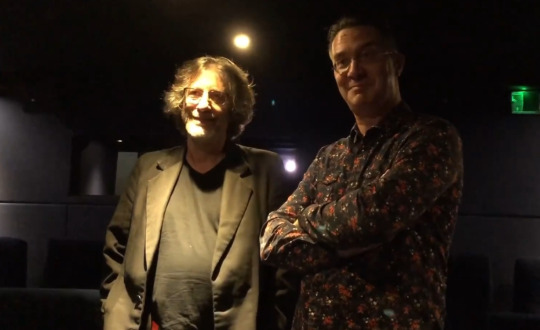
Differences between the musical and the book
The ending of the musical is a bit different, they were worried about it but Neil said, ‘I totally understand, the ending of the TV series is different, because I had something that was book-shaped and I needed to make it TV-shaped. And you had something that was book-shaped and you needed to make it stage-shaped.’
It opens with the burning of Agnes Nutter and Aziraphale and Crowley are introduced there.
Act One ends with them ‘essentially breaking up’ because of a huge argument and they dissolve their friendship, Act Two starts with the first time they meet.
The Future?
What is the future for the musical: in 2021 they said that they need to work on some things and then they hope to do another run, initially in Australia.
There will be a CD of the soundtrack available when the show is produced in it’s full version.
Videos
Vicki, Jim and Jay talking 46min about the musical (this video was shown at the Ineffable Con 3 in 2021 :))
Sizzle Reel 6min
Anathema singing The Perfect Place
Crowley calling Dagon to check on the hellhound
Shadwell and Newt
Aziraphale vanishing Hastur 👀
Links
Webpage
Instagram - a lot of more bts videos and pics :)
How to support?
Subsribe to the instagram page and like and comment that you want the musical on posts :)❤. If you want to be a sponsor or donor, there is contact on their webpage.
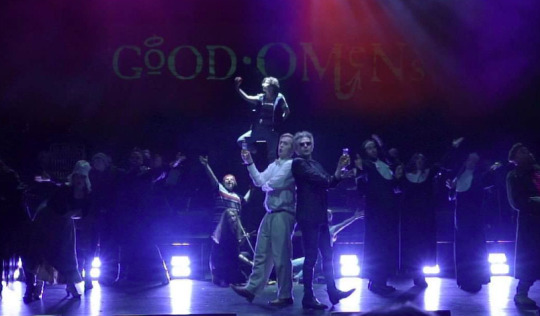
2K notes
·
View notes
Text
CW: A literal Serial Killer, obv gore description.
Yan! Serial Killer who didn't expect to fall head over heels for you, his supposed next victim. Don't get him wrong, he still wishes he could just yank those eyeballs out of your eye sockets and dip them into his cup of tea but he will refrain from doing so, just yet.
Yan! Serial Killer who loves to hide under your bed and waits for you to either fall asleep, stay up like a bat, or do your business. He's savoring every little noise you make like a fine wine.
Yan! Serial Killer who will actually stay in your home like he lives in it. Won't hesitate to make himself a dinner if you are a heavy sleeper (can always just knock you out with sleeping pills). That said he will also shower in your home, savoring the scent of the products you are using
Yan! Serial Killer who actually helps you in one way or another! Oh goodie, you ran out of soap! Here, let him refill it for you. Wait, you got a stain on your shirt. tsk tsk tsk, this will do justice. Hm? Are we running out of eggs? A visit to the market will solve the problem!
Yan! Serial Killer who loves to collect the eyeballs of anyone who dares to look at you for more than 5 seconds adoringly. He's lucid enough to differentiate which one to be spared and which one is not.
Yan! Serial Killer who almost squeals happily when you acknowledge him indirectly. "Perhaps my fairy godmother has finally come to help me," you quoted.
Yan! Serial Killer who can't help but stroke one out on your sleeping figure, his hand lifting your pajama up to reveal your chest. He will go as far as to rub his cock against your sex then whoops, plunge it into your hole <3
Yan! Serial Killer who contemplates whether he should cum inside you or not. One thing leads to another, and he chooses not to (It's rather troublesome to wash you up so he just came inside your mouth <3
!! Gore Warning !! (You don't have to read it if you are not a fan of it, nb: Cannibalism and Necrophilia + Backstory)
Yan! Serial Killer who somehow adores the idea of gutting you and feeling your innards, tasting how your heart beats against his tongue, or playing with guts as though he is making dough.
Yan! Serial Killer who adores you so much that he won't stop rutting against you, fucking you despite your state, cold and unmoving. Dead. He might even treat himself by burying himself deep in your guts huh?
Yan! Serial Killer who will not let death separate you two. Didn't you know that the reason he fell for you? Ah, you didn't know why he is branded as a serial killer too right?
Erickson is a man of wonder, due to his upbringing as the first heir of an infamous dukedom, he has been spoiled rotten with everything he has always wanted.
Nonetheless, he feels like he has never even once been given what he truly wanted because the supposed first heir is supposed to be his twin brother, Noel, who came out first.
In the mansion where his family resided, there was a servant who caught his twin brother's heart. A girl, or a boy? He pondered. It appeared that you were an orphan that his mother took in out of pity for your state.
It was not love nor fascination. It was the urge to take and destroy what Noel possessed and adored. And this kept going even until the three of you grew up as adults.
He would do anything to tarnish his brother's life, his position, his honor, and his beloved. That would also include you, his unrequited lover whom he accidentally met during his killing spree.
It was boredom that killed him and killing people kept him away from boredom. But you? You surely would not fail to ease his boredom for you were whom his brother longed for.
And what Noel longed for would be what Erickson longed for as well, alas loving you in his stead.
#Erickson the Chosen#CatboX#Yandere x Reader#Yandere Smut#Yandere Headcanons#Yandere Imagines#Yandere scenarios
917 notes
·
View notes
Text

It was that choice to be a community that led to the political mobilization of trans men as part of the queer liberation movement. In the pre-Stonewall era, the trans men who had the luxury of being out were rare and isolated cases, and often came from extremely privileged backgrounds that helped mitigate their gender: Eccentric millionaire Reed Erickson, who funded much early medical research on gender-affirming care, or British aristocrat Michael Dillon, a doctor whose 1946 book Self: A Study in Ethics and Endocrinology was one of the first books on trans medical treatment. The rest either went stealth (like jazz musician Billy Tipton, whose trans status was discovered only after his death) or never got to transition at all (like civil rights leader Pauli Murray, who spent much of their youth looking for doctors to prescribe them testosterone, then stopped when they became a nationally known figure). The idea of trans men as a coalition—a group of ordinary people organized around their shared political interests, gaining strength from numbers—was new, and it largely took shape in the lineage that ran from Dain to Sullivan to Green.
Great article on the history of transmasc erasure & activism in the US. It talks about how wildly shitty the WPATH was to trans men (initially having nothing on transmasc care, then making Jamison Green do a ton of unpaid labor to come up with guidelines, keeping none of them but using his name to get activists to shut up, then adopting his guidelines but never crediting him).
268 notes
·
View notes
Text
There is one thing from Star Trek: Discovery that sticks with me. It's the one crewmember in a wheelchair.
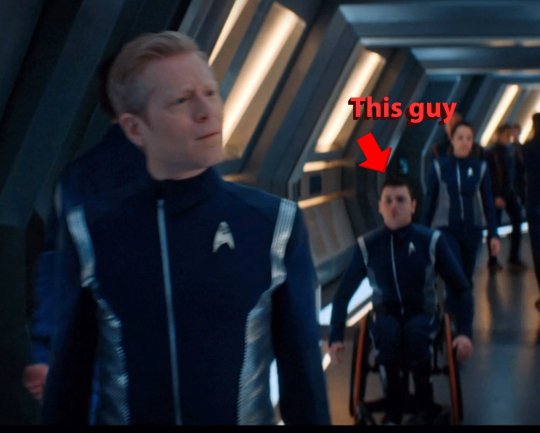
Why? Because in a future where almost any medical condition is curable, being disabled or using a wheelchair isn't seen as something that needs to be fixed.
Does he have a name or a backstory? No. But unlike Pike (ToS), Emory Erickson (Enterprise), or Admiral Jameson (Next Generation), he's not in the wheelchair because of some tragic accident or illness that left them scarred, paralysed, and/or disabled. He's not made the centre of a story of struggle and pity like Melora Pazlar (Deep Space 9).
There's no story of him trying or needing to be "fixed", "healed" or "cured", there's no story of him trying to adapt, there's no story of him getting in the way or being a burden. He's not seen as a tragic victim. He's not seen as unfit for duty or disabled.
He's just a guy in a wheelchair and a member of the crew.
#this is technically called incidental representation#which is representation of people going about their everyday lives#but this means everything to me#if only my thesis were on wheelchair users in literature and media#star trek#star trek discovery#discovery#star trek: discovery#disability#disability representation#wheelchair users#disabled representation#wheelchair
814 notes
·
View notes
Text
like we were so fucking robbed of seeing perez in the wake of saw vs events I want to see her getting out of the hospital and flipping tables and pointing a gun in ericksons face after being told that strahm is the lead suspect. I want to see her having a breakdown after strahms fingerprints come back dead. I want to see her hand twitching over her gun everytime she sees hoffman. I want to see her fucking losing it and desperate to avenge her friend and partner and to clear his name. I want to see the thought process that lead to her inviting known serial killer mark hoffman to the basement lab just so she could torture him psychologically before she had a legitimate excuse to shoot him. I want to see more of her and I want to see how strahms death impacted her the way the reverse impacted him.
#lindsey perez lindsey perezzzzz#we did not see nearly enough of her#she was so overshadowed by strahm in iv and then didnt even get to be a main character in vi#she showed up. psychologically tortured hoffman. and then she died (again).#realistically she's way better at hiding her insanity so I think she wouldn't lose it nearly as bad as strahm did#but I want just one little moment where she's on her own and she fucking loses it#forced to let your boss tell your best friend you're dead. he goes missing. is declared a suspect. turns up dead. no body to bury#more of her pov on these events please. please. please.#it would be so sanity inducing cause she KNEW it was hoffman. her last words to strahm was hoffmans name#and she knew him so well.... she must've known strahm went after him in the wake of her 'death'. the fucking guilt she must have felt#espeon cries#saw#i am so so sick in the head about her today
205 notes
·
View notes
Text
Okay I know that the pintshipping community is talking about the bathtub scene. Or the pint trap itself.
And it's so valid and so real
BUT OMG WHY IS NOBODY TALKING ABOUT WHAT HAPPENED AFTER THE TRAP?
And I partially mean Brit holding Mallick's head up and comforting him
But I wanna point out how when Erickson finds Brit, she's crawling around with a sharp ass object (probably the one from the bathtub trap too), out of the room, fully ready to protect her lame ass boyfriend.
Meaning, that despite the blood loss, having her entire arm basically cut open, she managed to crawl back to the bathtub, get one of the sharp things, and force herself to stay conscious, walking around the building when she heard noises, to protect herself AND Mallick, who passed out on the floor.
UGHGHH THEY MEAN SO MUCH TO ME GUYS Y'ALL DON'T GET IT....
#saw#saw movies#saw franchise#pintshipping#brit saw v#brit stevenson#mallick saw v#mallick scott#saw 5#saw fandom#saw posting#yes I might be insane#they mean so much to me#im soooo obsessed with them ugh
97 notes
·
View notes
Text
Milton Erickson and a Rabbi Walk into a Bar... (Essay)
Finally, I've finished this essay about connections I'm finding between hypnosis, Judaism, magic, and intimacy. It's ~4.5k words, extremely "me," and I'm really thrilled to share it. Enjoy!
--
My weakness is getting deeply invested in very niche topics.
Hypnosis was my first and most lifelong obsession. It was my confusing, shameful sexual fetish that I eventually took by the horns and -- through my desire to learn as much about it as humanly possible -- turned into a job. But not a normal sex work job where I do hypnosis for money -- a weird job where I just teach about it. The kink community, and the further-specific niche where people want to hypnotize each other during intimate experiences, became my home.
But the value of study doesn't really come from the quantity of people I'm able to engage with. It comes from the way it enriches my life. It creates and benefits from the capability to see overlaps between all of my various interests.
On the surface, it may appear that two skills have no relationship. But the deeper you get into each one, a synthesis appears.
At a certain point when you are learning hypnosis, all seemingly-unrelated information seems to fit effortlessly into your hypnotic knowledge. You can listen to a song and suddenly you learn something new about how to hypnotize someone. Maybe it was a lyric that gave you an evocative emotional response; maybe it was a pattern in the music that you thought about replicating with the rhythm of your hypnotic language.
Over a decade into my own hypnosis learning, I got very lucky and found a second passionate home in communities of Jewish text study about a year ago. I started from almost zero there and found myself again to be a greedy novice, obsessed with digging into it.
Of course, as I got further, it became that I read a page of Talmud (a text of rabbinical law and conversation) and suddenly I learned something new about how to hypnotize someone. And as I progress, it is starting to go the other way: I learn about Torah study by reading about hypnosis and intimacy.
There are two directions this essay can be read. “How can intimacy and hypnosis teach us about Jewish text?” And, “How can Jewish text teach us about intimacy and hypnosis?” One half is of each part written by me as an authority, and the other half is by me as an avid novice. The synthesis of these two parts of me -- just like any synthesis between concepts -- may perhaps create something new.
Models
I’m sure most communities have a version of the idiom, “Ask three people a question and get five answers.” For a long time, this was a source of frustration for me in the hypnosis community. Is hypnosis a state of relaxation and suggestibility? Kind of, but also no. Is it more accurate to say it is based on unconscious behaviors and thoughts? Well -- kind of, but also no.
So what is it? Well, it’s probably somewhere in the overlap of about 20-30 semi-accurate definitions and frameworks for techniques -- what we’d call “models.” Good luck!
Why is hypnosis so impossible to define and teach? How have we not found a model that we can all agree upon yet? I think many people share this confusion, and it's complicated by the fact that most sources for hypnosis education teach their model as the model. It makes sense -- it would be difficult to teach a complete beginner a handful of complex frameworks with which to understand hypnosis when that person is just trying to muddle through learning “how to hypnotize someone” on a practical, basic level.
…Or would it be? By the time I got involved with Jewish study, I had long given up on chasing the white whale of some unified theory of hypnosis. I was firmly happy with the concept that all ways to describe hypnosis are simply models -- and all models are flawed, while some models are useful. I was delighted, when entering Jewish community spaces, to hear the idiom, “Three Jews, five opinions.”
This concept is baked into Jewish text study, in my experience. You can look at any single line in Torah and find innumerable pieces of commentary on it, ancient and modern, with conflicting interpretations. Torah and other texts are studied over and over -- often on a schedule -- with the idea that there is always something new to learn. And this happens partially by the synthesis of multiple people's perspectives adding to and challenging each other, developing new models. My Torah study group teacher always starts us with a famous line from Pirkei Avot, a text of ethical teachings from early rabbis: “If two sit together and share words of Torah, the Shekhinah [feminine presence of God] abides among them.”
The capacity to develop and hold multiple interpretations at once enriches your relationship with the text. So too do I believe that being able to hold multiple interpretations of what hypnosis is and how it works enhances your skill with it. It is not a failure of the system -- it is the best thing about it.
Intimacy
It is intentional to make the distinction of “relationship with the text” -- not “relationship to the text.”
My job on the surface is to teach hypnosis, but the meta goal is to simply teach something that helps people develop profound intimacy with others. I think that hypnosis is a kind of beautiful magic that is well-suited to this, but it’s not the only path to take.
One of my favorite educators, Georg Barkas, describes themselves as an intimacy educator who teaches rope bondage. Their classes and writings are highly philosophical and align closely with my own ideas about intimacy -- as well as my partner’s, MrDream, from whom I’ve learned so much. I frequently cite Barkas when I talk about hypnosis because I feel the underlying ideas they have about rope bondage are extremely applicable to all kink and intimacy -- and I will continue that trend here.
Barkas recently published an excellent essay looking in detail at the concept of intimacy itself. They posit that our first thought of intimacy is usually about a kind of comfort-seeking and familiarity. That’s contained within the etymology of the word, and socially it’s what many of us think of when we define our relationships as “intimate”: settling in to engage with a partner who we love, know, and understand.
But, Barkas asks, what if we place this word into a different context? They talk of how in scientific endeavors, the goal of “becoming familiar with” is unpredictability and discovering things that are surprising and unexpected. This perhaps offers a different view of intimacy: intimacy where you do not engage with your partner as though you know everything about them; intimacy where being surprised by them and learning something new is the goal.
My partner MrDream teaches about this often in hypnosis education: approaching a partner with genuine curiosity and interest -- “curiosity” implying that you don’t know what to expect, with a positive connotation. There is a kind of delicate balance between being able to anticipate some aspects of what is going to happen hypnotically -- to have a general grasp on psychology and hypnosis theory -- versus holding tight to a philosophy that neither you nor the hypnotic subject really knows how they are going to respond. The unexpected is not to be feared, but celebrated and held as core to our practice. Hypnotic “subjects” (those being hypnotized) who can relax their expectations will often have more intense experiences.
Thus we come to the first time in this essay where I mention Milton Erickson, my favorite forefather of modern hypnosis. Erickson was a hypnotherapist active through the 1900s and is famous (among many things) for presenting a model of hypnosis that wasn’t necessarily an authoritative action done to a person, but a collaborative and guiding action done with a person.
In his book “Hypnotic Realities,” he talks about how his view of clinical hypnosis is defined by how the therapist is able to observe each individual client and directly use those observations to continually develop a unique hypnotic approach with them. The client’s history, interests, and modes of thinking are utilized for the trance, as well as any observable responses they have in the moment. For example, a client with chronic pain may have the frustration they express over that pain incorporated into the trance. This is in deep contrast to hypnosis where the therapist comes in with any kind of “script” or formula to recite ahead of time.
It’s important to Erickson’s model that the therapist doesn’t know exactly what to anticipate, and it’s also important hypnotically that the same is true for the client. A common “Ericksonian” suggestion is, “You don’t have to know what is going to happen, and I don’t know either.” In order to develop the most effective approach with each patient, Erickson would enter into a session with some presumed knowledge, but ultimately learning -- not assuming -- how to best hypnotize each individual person.
We circle back to the phrase, “a relationship with Jewish text.” In my opinion, engaging with Torah is exactly this kind of intimacy. Torah is something we come into in order to poke and prod at it, to interact with it and to see how it interacts back at us. The teacher of my study group always cites a model where Torah itself is a participant in our partnered learning and group discussions. We ask it questions, we push its boundaries, we strive to glean something new and yet unseen. A line that may seem simple on the surface can reveal much more when we explore its context or put it into a different context entirely.
This is easier for me to say as someone who is coming into learning Torah for the first time, but I am able to look ahead to when I will be fully familiar with the text and still be able to take this expanded definition of intimacy with it. Not coming to it without a sense of comfort, but still engaging with curiosity. MrDream teaches a model for hypnosis that is based on the idea of exploration -- exploring your partner no matter how long you have been with them. You are always coming to them as a different person, shaped by your ever-growing experiences and identity, and your partner changes as a human as well. I believe Torah is also dynamic in this way, as the context within which it exists -- and the way we interpret it -- is constantly shifting.
Ritual
I have been engaging with spiritual ritual on and off for as long as I’ve been learning hypnosis. The concept of magic has always been alluring to me -- not from a motivation to meet specific goals, but for something more difficult to pin down. I like that ritual, in an esoteric framework, is about looking at various metaphors between ingredients and actions; a candle representing an element of fire which may in turn represent intensity, or purity, or something else. Drawing meaningful connections between concepts like this is a skill I’ve developed in parallel with hypnosis, as well.
I was recently talking with a friend of mine who is also interested in esotericism -- we were sharing our frustrations with various books on magic and ritual. We wondered why so many sources would go on to teach prescriptivist formulas and associations, and not much else. Do this, and that will happen. This symbol represents that. My friend and I agreed that the ritual value of ingredients comes from how you personally assign meaning to them -- but why was everything always trying to teach us their meaning, as opposed to teaching us how to cultivate our own associations?
A week or so later, I happened to go to an excellent class that explored whether or not there was a place for smudging and smoke use in modern Jewish ritual. The teacher first took a careful, measured approach towards looking at indigenous smudging practices and the concept of appropriation. What followed was 30 minutes of history and text exploring examples of smoke in early Judaism, and then 30 minutes of a handful of interpretations of what “smoke” could mean and represent with relation to Jewish ideas -- directly practical to modern ritual. It was utterly excellent and immediately profound for me, as someone who has been yearning to blend my experience with esoteric ritual with my relationship with Judaism.
Observant readers will note that through this essay I speak passively about Judaism -- I am a patrilineal Jew, which for better or worse means that it is not a simple matter to say, “I am ‘fully’ (or ‘not’) Jewish.” (I am in the beginnings of working with a Conservative rabbi -- who affirms that I’m Jewish -- to make my status halachic [lawful], which is deeply exciting.) Opinions on that aside, a relevant piece of information is that the Jewish holiday we celebrated most consistently when I was growing up was Chanukah. While a lot of Jewish practice has been something I’ve been striving towards as an adult, Chanukah has always been “mine.” It was fast approaching after this class, and I felt motivated to use my newfound knowledge to make more ritual out of lighting the candles.
I was deeply surprised when all I did was light a stick of incense before saying the blessings over lighting the menorah, and my experience transformed into something intense. I smelled the incense and couldn’t help but think about what I’d learned about the Rambam’s commentary that incense in the time of the Temple was about making the Temple smell sweet to pray in after the burning of sacrifices. I thought about what I’d learned about the presence of God being smoke and clouds to the ancient Israelites. I thought about things I’d learned from other places -- hiddur mitzvah (the value of beautifying a practice), and a midrash (parable) about God loving the light and rituals we do in a very personal way simply because they are from us.
Esoteric ritual has often felt to me like exerting effort in making the associations of ingredients work for me. But this was effortless. I was doing something that was entirely my own, solidly founded by the broad and deep study I’d done, by my personal relationship with the concepts, by my identity.
In other words, the power behind this ritual came from knowledge, and the knowledge came from my intimacy with it. And that intimacy was not just with the study I had done -- it was also the process of being surprised in real time by what I was learning through the ritual itself.
Hypnosis gains “power,” in so much as we let ourselves use the term, through these same acts of intimacy towards knowledge. It operates directly based on various ingredients: how much we know about hypnosis theory itself, general psychology, the person we are working with, and ourselves. Hypnosis is a ritual -- it is setting aside special time to do something with a collection of ingredients that you have personal associated meanings with. If you can’t connect to those deeply enough, it won’t reach its full potency.
Knowledge, Perception, and Unconsciousness
One of my favorite concepts to teach in hypnosis is, “A change in perception equates to a change in reality.” This is derived from Erickson by MrDream, and it’s something he and I have had a lot of conversations about to refine. The implication of this is not something as trite as hypnosis having the power to change a person’s perceived reality. It is the concept that if you look at something from a different perspective, you gain various different capabilities.
For example, when you are feeling stuck in a situation and you think about what a close friend of yours would do if they were in your shoes, you gain the capability to see more options, to change your actual view of the reality of the problem and therefore change your actions towards it. In hypnosis, this could be the difference between simply telling someone to relax their legs versus another perspective of telling them to imagine what it would be like if their legs just started relaxing. It could be the idea that when a person does feel relaxation from a simple suggestion, their perception changes on what is happening -- they build more belief in hypnosis, and that belief in turn makes the next suggestions easier to buy into.
Erickson’s model of hypnosis is predicated on the idea that hypnosis itself matters, that hypnosis is a time within which someone’s reality changes. In his ideal hypnotic context, the subject feels like they no longer can expect things to behave as they usually do in their “waking” reality. They are thus opened to many different kinds of new experiences and capabilities. To Erickson, perception matters -- by itself, it’s a primary driving force behind literal change and response.
This ties back to our idea of intimacy -- just as I aim to approach my partners with this profound curiosity, just as I aim to approach Torah, I want to have this intimacy of the unexpected with trance itself. I want to allow myself to be surprised by hypnosis, by the things I don’t yet know about it even after more than a decade and thousands of hours of trance. But more than this, in an Ericksonian sense, simply changing my perspective to this motivation is one of the things that lets me get there.
I went through a guided study class about Shabbat (Judaism’s weekly sabbath of rest) with a partner, and so much of the class was in the abstract that it at times felt difficult for me to latch onto. We were learning all of this background context about a view of Shabbat where instead of spiritually striving and reaching on that day, you come in acting as though your spiritual work -- like your other work -- is “finished.”
In one session, we spent a chunk of time parsing through how we could interpret that as actionable. It felt like it just wasn’t clicking for me -- the midrashic texts weren’t offering enough for me to feel like I could make judgments on questions like, “Does this imply I shouldn’t meditate on Shabbat in this context?”
It wasn’t until I slept on it that I found a very simple piece of the puzzle: putting aside the questions of concrete actions, in an Ericksonian sense, the internal act of shifting my perspective would absolutely change the way I behaved and interacted with the day. It would become more indirect and unconscious -- instead of carefully analyzing my actions as I might with other Shabbat prohibitions on work, I could simply let myself act in ways that fit that perspective of “spiritually resting.”
The abstraction of the class made more sense -- perhaps it wasn’t trying to give us direct answers, but rather create a psychological environment for us that was well-suited to this more unconscious processing. Or rather, in addition to the sort of typical conscious halachic interpretation. If I allow myself an opinion here, I’d say that I care about halacha as actionable, but as always, I tend to care more about feelings and what’s internal.
This also lent credence to ways this class and the class on smoke and ritual changed my experiences. I was not given a set of actions to take, but rather a variety of perspectives that unconsciously made me think and behave differently. The concept of “knowledge is power” is both true and alluring in many different contexts, and yet had often fallen through for me in most ritualistic frameworks. The way that it succeeds, I believe, is when you develop a relationship with knowledge that actually changes your internal perspective and perceptions.
Limitation
With this we return to the concept of models and interpretations. It is serendipitous to be going through these experiences at a time where I am avidly working on my next book -- the thesis of which is that in order for us to progress as hypnotists, we must get comfortable moving fluidly between many differing definitions and frameworks (models) of what hypnosis is and how it works.
It is as the Ericksonian principle would say: If you take a perspective on hypnosis that boils down to “hypnosis is about relaxing the conscious mind,” you will do hypnosis according to that perspective. You will use relaxation-based techniques and make an effort to get someone to think “less consciously.” If you instead take a perspective that is “hypnosis operates based on activation of the conscious mind,” you may do hypnosis that causes someone to think and process in a more stimulating way.
Both and neither are true, and they can coexist. I believe that most models can be useful -- some more useful than others. But the best thing you can do is to not assume that one model is the most correct one -- instead, it is to develop the capacity to work within many at once even while being aware of their boundaries.
Jewish text, in my experience, provides models -- perspectives that themselves give guidance on how to understand things and act. I think especially about midrash and stories that are explicitly intended to fill in the gaps or give an alternate view on something. The question of, “Is there one correct way to do/see things” is more complicated here, but there are areas -- especially in those subtle shifts of mindset for ritual or interpreting text -- where the answer is still “no.”
My time so far in Jewish study supports this in a different way. There is a human element of collaboration and challenge. Learning as we do with a chevruta (study partner) adds another person to the relationship -- it is no longer just between you and the text. There is another human who you are building something with, and it is “intimate” according to our exploratory definition in an even clearer way.
The purpose of a “scene” inside of kink (a “session” of kink play) is to operate in a semi-limited framework -- limitations exist on who is involved, where it begins and ends, how partners communicate, and what themes/topics/activities are involved. These limitations -- though they may be quite broad -- are partially what allow for intense experiences. A scene needs to exist in a different “space” than our daily lives, and it needs to operate by different rules and involve different ingredients. Here, we also see overlaps with the definition of a “ritual.”
This doesn’t just facilitate intensity (and safety) -- it facilitates learning something new about your partner. By taking your relationship and putting it into a limited context, it allows you to observe it in a more careful way, where novel changes can be more obvious.
Studying with a chevruta is much like this. I have had study sessions where my chevruta and I are meeting for the first time and the only thing we are aware of sharing is our desire to dive into a piece of text. I’ve also had chevrutas where we know each other outside of study, and some of our time is schmoozing and catching up. But in all cases, we are limited in scope, and that limitation creates ease of access towards the common goal of expanding our knowledge and relationship with the text. We are focused; we are motivated. We are creating something that we can only create through who we are as individuals and what we are doing as avid learners.
This has surprised me at times with its tenderness and intensity. Building well-founded interpretations with someone is in and of itself very intimate -- not sensually, but humanly. It has given me something I have always wanted -- an intimacy that is pervasive not just in application of knowledge, but in the development of it. A feeling of sacredness and joy from being able to see so many different perspectives.
I long for this connection, this alchemy. Yes, all models are limited. But within those tight, restricting limits is the potential energy of creation.
“And I Must Learn”
There is an infamous story in the Talmud, in Berakhot 62a, where Rav Kahana hides under the bed of his friend Rav Abba. Rav Kahana hears Abba and his wife giggling and starting to have sex, and remarks out loud that Rav Abba is acting like someone who is famished. Rav Abba, mid-sex, understandably says, “Kahana, why the fuck are you under my bed listening to me fuck my wife?” Rav Kahana replies, “It is Torah, and I must learn.”
There was a version of this essay that began with this tale. I am enamored with the vast overlaps I can derive from its briefness: that intimacy can be studied sacredly both as a general concept and specifically with your partner; that we are obligated to learn ourselves, our partners, and general human desire; that there can be a thread of wholeness in every action of your life if you give every action sacred attention.
Even this, though, is a limited-context interpretation. The rabbis of the Talmud were certainly not sex-positive, especially not as we currently use the term. The surrounding triptych of conversations is similarly humorous but seems to comparatively describe sex as dirty or gross, and this bit of text cannot really exist separately from all of the places where there is halacha derived about sex that is about controlling women’s bodies or preventing queer and trans people from being able to live authentically.
But -- we are allowed to interpret like this. We are allowed to play with context and see what we discover.
For me, this is about finding the connections between my actions and my interests; parts of me that synthesize the whole. It is about developing intimacy with Torah, with my learning partners, with my romantic partners; with the people within the writings, with the authors, and with the readers.
Reading Torah is the same as hypnotizing someone is the same being intimate with someone is the same as doing a ritual. All things on a broad enough scale overlap this closely. There is value in this “zooming out” to a wide enough context to see the connections that exist -- just as there is value in celebrating the limitations that arise, models nestled alongside each other, when you “zoom in.”
We need both to be able to treat our learning -- all forms of it -- as something special.
89 notes
·
View notes